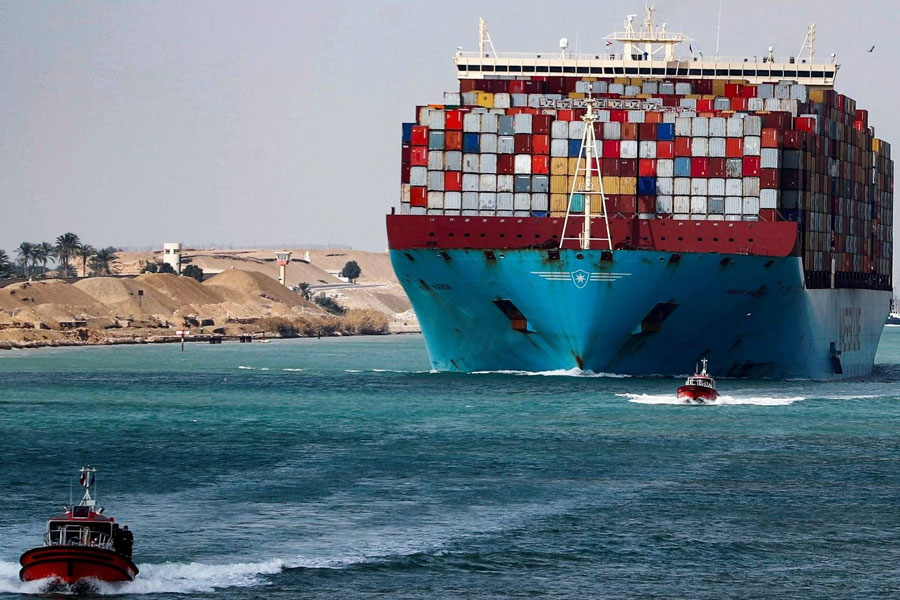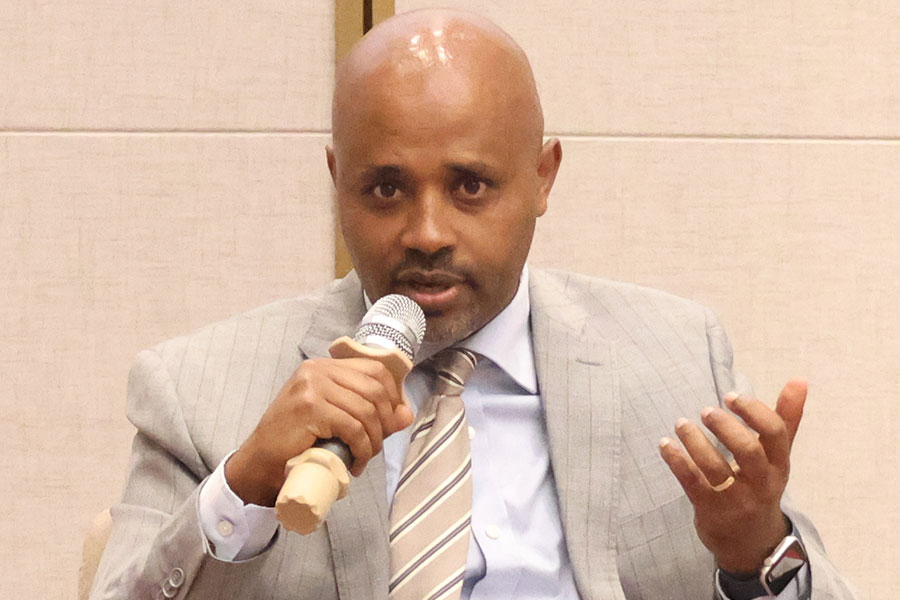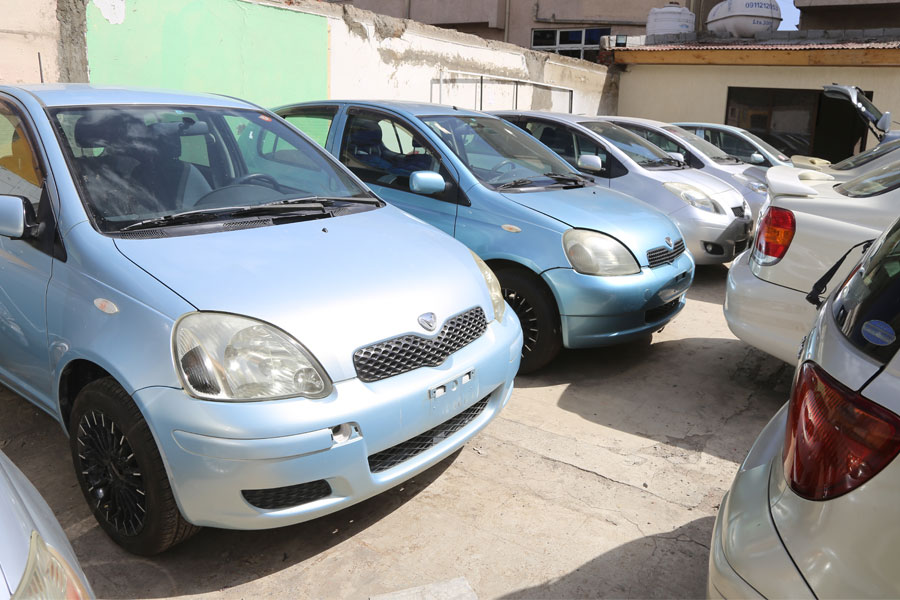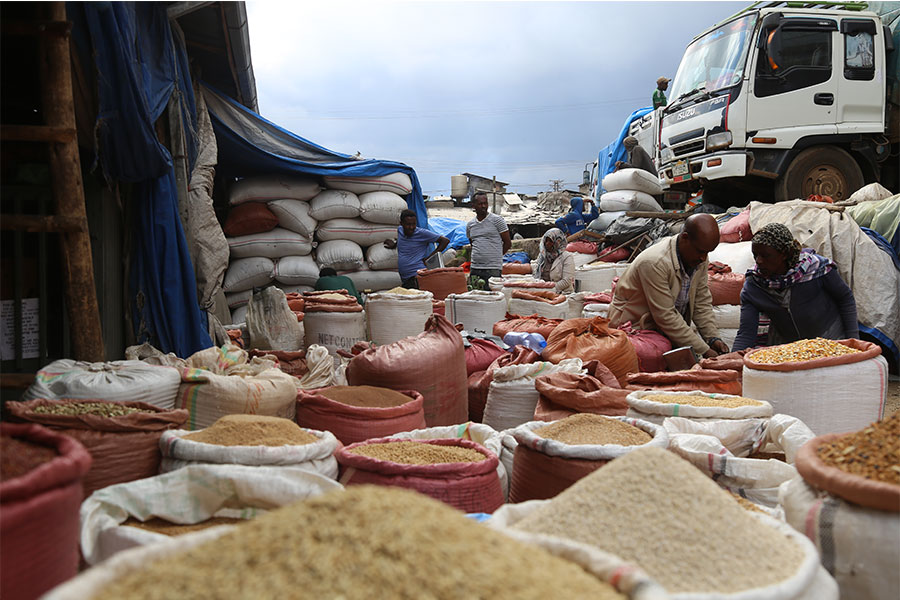
News Analysis | Mar 23,2024
Trade officials from regional states are in an uproar over the worsening cement shortage sending retail prices through the roof. They have lodged complaints with federal authorities.
Cement supply shortages have become common over the past couple of years, but the situation has worsened last month. The stocks of retailers and wholesalers across the country are depleted following the introduction by federal trade authorities of a directive a month ago, which sought to end the distribution of cement through agents.
Gebremeskel Chala, minister of Trade & Regional Integration (MoTRI), followed the directive with a price cap. He told factories to sell a quintal of cement to designated distributors between 770 Br and 870 Br. Although the measure was meant to stabilise the market, retail prices have surged to 2,000 Br a quintal, more than triple what manufacturers offer at their gates. Federal officials, however, stand by their decision.
“The cement supply chain used to be long and complex,” said Hassen Mohammed, a state minister for Trade. “This had a profound impact on the retail price.”
Five regional administrations submitted formal complaints to the Ministry last week. They blame the shortages on cement factories not supplying distributors based on quotas set by the Ministry. Intermediaries in the Amhara Regional State trading cement informally sell a quintal of cement for over 2,000 Br, disclosed Abeje Ayehu, deputy head of the region’s Trade Bureau.
His office is among those that lodged their complaints to federal authorities. The regional administrators expected more than 61,000tns of cement supply monthly from seven plants.
“Designated distributors are not getting cement based on the quota,” said Abeje.
There are 25 selected distributors in the region that source cement directly from the factories. Amhara state administrators expect Mugher Cement Factory to supply close to 16,000tns a month.
Established in 1984, the state-owned Mugher Cement is one of the seven factories expected to supply cement to the region’s distributors. The plant can produce one million tonnes annually. However, Gezahegn Dechasa, general manager, disclosed that Mugher utilises a fifth of its capacity.
“We’re doing our best to supply more cement under the circumstances,” said Gezahegn.
The situation is similar elsewhere.
The monthly quota assigned by the Trade Ministry to the Dire Dawa City Administration stands at 6,500tns, to be supplied by Pioneer and National cement factories. An assessment conducted last year revealed that the quota matches only half of the demand, according to Abdi Muktar, deputy head of the Dire Dawa Trade Bureau. The Bureau has established a committee to monitor the marketing activities of cement factories.
“The shortage worsened because factories are not supplying based on the quota,” Abdi told Fortune. “We’ve apprehended 10 trucks carrying cement leaving the city illegally.”
Addis Abeba’s cement markets, too, are feeling the burn.
Henok Eshete, a taxi driver, was roaming around Megenagna last week to buy cement to refurbish his two-bedroom house. But cement was nowhere to be seen in the capital’s retail hub. After a half day of the search, he found brokers willing to sell for 1,850 Br a quintal.
“It’s beyond my budget,” Henok told Fortune.
The business slowdown around Megenagna has also affected the lives of those who earn their livelihood transporting cement to and from retail shops.
Tsegaye Zergaw is one of them. For the past 15 years, the father of two has been in the cement transport business. He makes 700 Br for each trip of three a day.
“I haven’t made a single trip in the past two weeks,” Tsegaye told Fortune.
The Ethiopian Industrial Inputs Development Enterprise is one of the entities authorised to distribute cement in the capital through six outlets. Five factories, including Derba, Dangote, and Mugher, have to supply 50,000tns of cement a month to the Enterprise. Over the last two weeks, the Enterprise made payments to buy 22,000tns of cement. However, it received less than a third of the volume.
Solomon Girsha, deputy chief executive officer (CEO), says he knows a quintal of cement is on sale for more than 1,800 Br without traders issuing receipts.
The problem is more about supply-side issues than the inadequacies of the quota system, argues Solomon. Experts agree.
Getie Andualem (PhD), a lecturer at the Addis Abeba University College of Business & Economics, notes that the shortages come due to the government’s failure to anticipate the rise in demand and act accordingly to attract investors to the cement industry.
“No company joined the industry in the past five years,” he said. “On the contrary, a few factories ceased production.”
There were 13 cement plants with an aggregate production of four million tonnes yearly. Their ranks have dwindled to 10 with a production of 1.7 million tonnes. The turbulence is partly due to a shortfall in production as factories struggle to use installed capacity.
Dangote Cement produces no more than a fifth of its 2.5 million tonnes in annual potential. The same goes for Derba, a factory owned by Mohammed Ali Al-Amoudi (Sheikh) and his family. Its production is slightly more than 10pc of its 2.3 million tonnes annual capacity.
“It’s no secret there is a mismatch between demand and supply,” the State Minister concedes. “We’re trying to create a mechanism that ensures the fair distribution at reasonable prices.”
The executives of cement factories attribute the decline in production to a coal shortage.
Established in 2005, Ethio Cement can produce 64,300tns a month. However, its output is closer to a third of this, according to Yigerem Zerihun, marketing manager.
Cement factories source coal from small-scale miners operating in four regional states, including the Oromia and Benishangul-Gumuz. The miners supply unwashed coal, which has an average energy production capacity of 2,500 kilo-calories a kilogramme. Washed coal, which cement factories had been importing, generates up to 4,000 kilo-calories of power.
“The availability of the local coal is also unpredictable,” said Yigerem.
However, Hassen argues that factories act like agents, selling cement directly instead of supplying it to designated distributors. The Trade Ministry has established a task force to monitor the cement supply chain.
Warns Hassen: “We’ll take swift measures on those who operate outside the system set up by the government.”
PUBLISHED ON
Aug 27,2022 [ VOL
23 , NO
1165]

News Analysis | Mar 23,2024

Radar | Dec 17,2022

Commentaries | May 11,2019

Verbatim | Oct 05,2024

Radar | Jul 13,2024

Fortune News | Jun 14,2020

Agenda | Mar 16,2019

Covid-19 | Mar 30,2020

Featured | Jun 01,2019

Radar |

Dec 22 , 2024 . By TIZITA SHEWAFERAW
Charged with transforming colossal state-owned enterprises into modern and competitiv...

Aug 18 , 2024 . By AKSAH ITALO
Although predictable Yonas Zerihun's job in the ride-hailing service is not immune to...

Jul 28 , 2024 . By TIZITA SHEWAFERAW
Unhabitual, perhaps too many, Samuel Gebreyohannes, 38, used to occasionally enjoy a couple of beers at breakfast. However, he recently swit...

Jul 13 , 2024 . By AKSAH ITALO
Investors who rely on tractors, trucks, and field vehicles for commuting, transporting commodities, and f...

Oct 25 , 2025
The regulatory machinery is on overdrive. In only two years, no fewer than 35 new pro...

Oct 18 , 2025
The political establishment, notably the ruling party and its top brass, has become p...

Oct 11 , 2025
Ladislas Farago, a roving Associated Press (AP) correspondent, arrived in Ethiopia in...

Oct 4 , 2025
Eyob Tekalegn (PhD) had been in the Governor's chair for only weeks when, on Septembe...